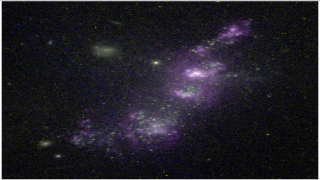Bibcode
Alvarez, P.; Rodríguez Espinosa, J. M.; Castro López-Tarruella, F. J.; Pi, M.; Hammersley, P.; Cavaller, L.; Siegel, B.; Molgo, J.; Pancorbo, J.; Ascanio, R.; Prieto, G.; Calvo, J.
Bibliographical reference
Ground-based and Airborne Telescopes II. Edited by Stepp, Larry M.; Gilmozzi, Roberto. Proceedings of the SPIE, Volume 7012, pp. 701202-701202-12 (2008).
Advertised on:
8
2008
Citations
0
Refereed citations
0
Description
The GTC (Gran Telescopio Canarias) is an optical/IR telescope, with a
10,4 meter segmented primary, installed at the Observatorio del Roque de
Los Muchachos (ORM), at La Palma. Past July 2007 it saw its First Light
showing a very promising behaviour. The very good image quality achieved
at that an early stage of telescope commissioning is a direct
consequence of the quality of its optics, the high performances of its
primary mirror control system, and the highly engineered telescope
structure and servo system. At present, we are advancing with the
telescope commissioning whose first results are presented here. The two
Day One science instruments: OSIRIS and CanariCam are being prepared for
installation and commissioning on the telescope. Science verification
are planned to be initiated by the end of 2008 and regular operation by
March 2009.
Related projects

Starbursts in Galaxies GEFE
Starsbursts play a key role in the cosmic evolution of galaxies, and thus in the star formation (SF) history of the universe, the production of metals, and the feedback coupling galaxies with the cosmic web. Extreme SF conditions prevail early on during the formation of the first stars and galaxies, therefore, the starburst phenomenon constitutes a
Casiana
Muñoz Tuñón